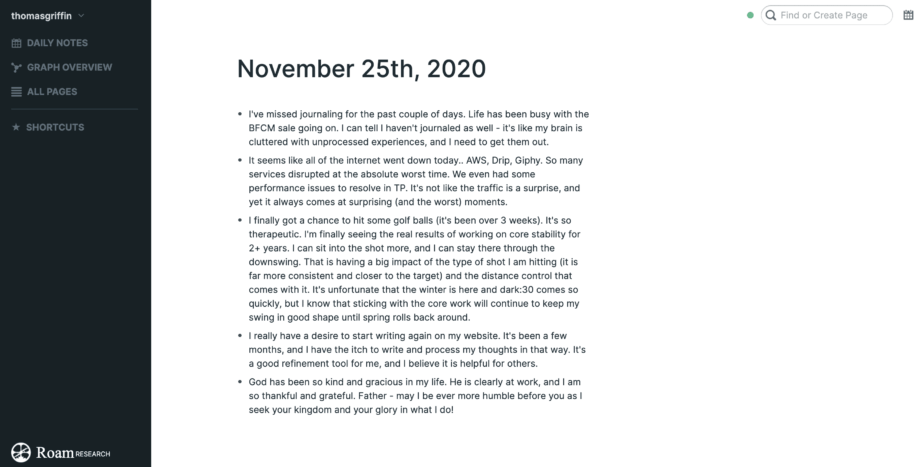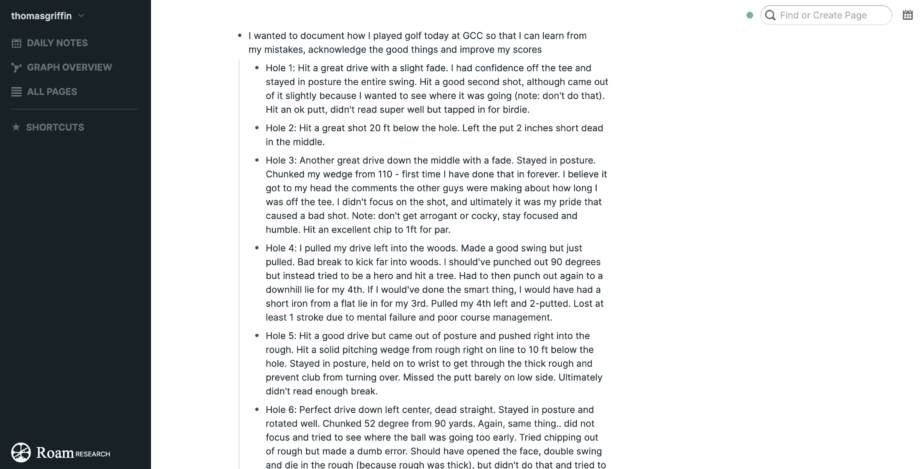Did you know that daily journaling is powerful? Even surprisingly powerful?
During the 1980s and 1990s, the Oprah Winfrey show was one of the highest rated shows on television. It consistently amassed millions of views for each show. “Oprah” became a renowned philanthropist, received the Presidential Medal of Freedom and eventually achieved the rare status of billionaire.
How did she do it? She attributed it largely to a simple daily routine: journaling.
People who keep journals live life twice.
Jessamyn West
Key Takeaways
- Daily journaling is the process of reflecting on the events of your day and adding commentary to them.
- Daily journaling is powerful because it unlocks new insights from past experiences. It’s a fabulous accelerant to personal growth and meaningful identity change.
- You can start journaling today in 3 easy steps: grab a notebook, write down a single sentence about today, and review your entry from yesterday. It really is that simple, and it really is that powerful.
What is Daily Journaling?
Daily journaling is the act of thinking about your life and writing it down each day. No more, no less.
It’s surprisingly simple, profoundly powerful and yet hardly anyone does it.
I’ve spoken with many people who scoff at the idea of daily journaling being surprisingly simple. At some point in time, they came to the belief that journaling was difficult, full of answering questions that didn’t really matter.
I’m here to tell you otherwise. It can certainly be that way for some people, but it doesn’t have to be that way for you.
Take it from me. I use a simple app called Roam Research to journal daily. It automatically begins with the current day and the cursor focused on a bullet point. From there, I begin typing. There are no prompts, no questions to answer, and most importantly – no pressure to face.

You may not realize it, but a lot of things happen during the course of your typical day…
You run late for work. You receive an unpleasant email. You are surprised to discover your favorite coffee is back in stock! You get an encouraging text from a friend. Your boss changes a deadline on a project you are responsible for. Your co-worker drops the ball on a proposal. Your kids decide today is the day to pick up a new hobby called junk piles (yes, this is a real thing from my oldest son). You have a deep, meaningful conversation with your spouse.
That’s a lot to process. Most people stuff it down and chose to deal with it later. Some don’t deal with it at all.
Bad idea.
Why is Daily Journaling Important?
Let me explain.
1. Daily journaling gives you the chance to discover new lessons from past experiences.
I love the game of golf. I love playing, practicing and even watching golf.
Over the course of time, I’ve gotten to be pretty good. I’ve even written an extensive article on how to get better at golf. At the end of 2021, I’m a +4.1 handicap – better than scratch.
But my game radically changed after I began daily journaling. Let me show you an example of a daily journal entry I wrote earlier this summer after I played a round of golf.

It was the most honest assessment I could give myself of how I played that day. I wasn’t trying to make things seem better or worse. I only wanted to understand and process what happened on the course.
I documented every shot on each hole. Maybe I hit a good drive but a poor approach. Maybe I chunked a wedge. Maybe I made a really good putt.
The first time I did it, I thought to myself “This feels nice but a little like a waste of time”… but by the third round journaled, I noticed a surprising pattern. I continually came out of tee shots and lost them to the right.
And that’s when the lightbulb moment happened.
Daily journaling unearthed patterns that had been hidden from my sight.
I learned a new lesson from repeated past experiences: I had a problem coming out of tee shots early, and as a result, I lost many of them to the right of the fairway.
So what did I do? I went to work fixing problem.
I practiced at the driving range with a single goal in mind: eliminate coming out of tee shots early.
I went to the gym with a single goal in mind: eliminate coming out of tee shots early.
I play rounds of golf with a single goal in mind: eliminate coming out of tee shots early.
The result? I drastically reduced the number of tee shots I lost off to the right, and my scores improved.
I didn’t stop there. I noticed other patterns in approach shots, chipping and putting, and I got to work on those too. Round by round, my scores began to drop, and they consistently stayed low. Whereas a bad day may have been a 78 before, it was now a 73.
Golf is my anecdotal evidence of the power of journaling daily. Your area of focus will be different, but your results will be surprisingly similar.
As you learn to apply new lessons from past experiences, your present and future results will change for the better.
2. Daily journaling gives you proof of real progress.
Awareness and attention are foundational components of change. Daily journaling brings both to bear in numerous aspects of your life.
Part of learning how to journal daily is documenting the good and bad. Some days you will crush it; other days will crush you.
The daily journal doesn’t show partiality, and that’s where its power lies. A single glance at a past entry will remind you of how much you’ve grown.
And, in a positive way, it’s motivating. You want to write down something good that happened during the day, so you work to make it a reality.
Daily journaling is a simple reminder that you are not static. You do change, no matter how slowly, and daily journaling gives you the right catalyst to change for the better.
3. Daily journaling gives you evidence of identity transformation.
You are not the same person you were this time last year. But on a day to day basis, you don’t notice how you change.
One well written article here. One video watched there. One new TV show consumed. One book read. One difficult conversation with a friend.
These small, seemingly insignificant events have a deep impact over time. I know from this from experience: the daily journal documents your story of change.
In my early 20’s, I was gripped by a book called “Don’t Waste Your Life” by John Piper. As I read the book, I experienced a sinking feeling: what have I done the last 3 years of my life?
I grasped for answers and found no good ones. It’s not a fun place to be when you realize you’ve wasted precious time from the one life you’ve been given.
From that moment on, I wanted to be intentional and aware of the impact of my life. Daily journaling provided a gateway into understanding that impact, but more importantly, it provided an avenue to change my identity as a person who wants to have an impact in the world.
Everyone wants to matter. I’ve never spoken with anyone who doesn’t want to make a difference in the world. Daily journaling is the introspective tool that helps you build an identity around the person you want to be.
How to Journal Daily (3 Simple Steps)
While many people like the idea of daily journaling, few people stick with the process of doing it.
Here’s a surprising truth: there’s no one right way to do it.
There are many ways, sure, but no one right way. It’s like the old adage: the best system is the one you use.
In my time building software products, I’ve learned that the best way to get people to use software is to eliminate friction. Even the tiniest bit of friction causes a marked decline in user activation and activity. Remove friction and usage jumps.
Daily journaling is no different. Inject the slightest bit of friction into the process, and you’ll have a hard time starting or doing it with regularity.
So, here’s what I suggest in your quest to learn how to journal daily:
- Grab a physical notebook, open up a Google Doc or create an account on Roam and write one sentence. That’s it. Just one sentence.
- If using a physical notebook, keep it in a place that you see often. If using your computer or phone, keep a tab open or put the app on your home screen. Awareness and attention leads to activity.
- Read the previous day’s entry after you jot down today’s entry. It’s a reminder of progress, and that’s powerful.
I advocate for this process because it’s easy to start and keep doing. Over time, you’ll create a habit, and then you can work to optimize, improve or adjust your daily journaling process.
Here’s an example one sentence entry from my daily journal on August 9, 2020:
Today was quite a difficult day. Miles was a pain and he frustrated me most of the day. I was short with him when I shouldn’t have been, and I need to apologize to him tomorrow.
That’s all I wrote. It helped me process what had happened (a rough day with my son) and what I needed to do in light of it (apologize to him for being short). Over time, I’ve found myself becoming more patient with him and quicker to ask for forgiveness when I’ve been in the wrong.
If you aren’t sure of the questions you should answer, here are some helpful examples that you can use:
- What happened today?
- How do I feel today?
- How did I sleep last night?
- What can I be grateful for today?
- What did I learn today?
- What is holding me back?
- Who do I need to talk to?
- What decisions did I make?
My hope for you is that you would quickly learn how to journal daily and stick with it. It’s a surprisingly powerful tool to help you to grow into the person you want to be.
If you have any questions, feel free to contact me. I’d love to help!
And, as always, if you’ve found value from this content, please share it with others. You can quickly share on social media using the buttons available in the article, or you can email the content to a friend or colleague.
To growing through the power of daily journaling,
Thomas

P.S. Daily journaling helped influence my article series called Welcome to Leadership. I encourage you to read it!






I have been journaling for some time, the dreams I had last night, my goals, my feelings and things I observe about myself. I have not done that in the previous month and I can tell because there is so much in my mind even my focus is split. Thanks for this reminder.
I totally understand! If I miss journaling even for a day, my brain feels foggy, and my thinking feels unclear. Daily journaling keeps my brain focused and mind clear!
What is a suitable time to journal?
I find myself journaling all throughout the day, but one of the best times to do it is right before you go to bed. It allows you to collect your thoughts, reflect on the day and get a better perspective for tomorrow.
Hello sir, it’s a great article to understand journaling and also the path for how to generate my daily journaling and how to get rid of guiltiness.
THANKS A LOT SIR.
You are quite welcome – glad you enjoyed the article!